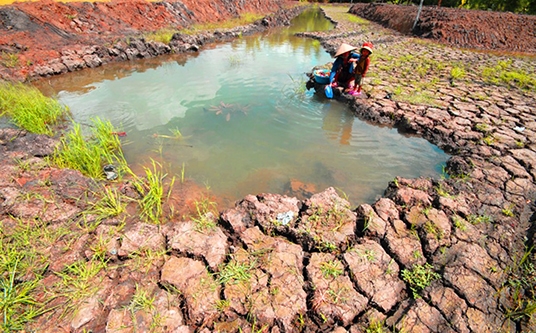Mekong Delta farmers struggling with aftermath of drought, salinity
 |
| Farmers in the Mekong Delta are struggling to resume agricultural production because of the lingering effects of the recent drought and saltwater intrusion and a shortage of funds and seeds. - Photo thoidai.com.vn |
Affected farmers in Cà Mau are unable to get financial support from local authorities since the Ministry of Finance requires them to furnish crop records they had submitted to the local government.
However, during the cultivation process, household farmers just do not have the habit of reporting on their crops.
Thus, none of the affected shrimp farmers in the province have managed to get subsidies from the government after the disaster.
Châu Văn Út, a farmer in the province’s Trần Văn Thời District, who has a 1.3 hectare shrimp farm, lost VNĐ200 million (US$9,000) due to the drought.
While he is happy to know that the local administration is helping affected farmers resume production, he is worried because he does not have documents to prove his loss and hopes the authorities will help with funds, seeds and technology.
Duy Quốc Tuấn, head of the district Department of Agriculture and Rural Development, said the biggest problem was that farmers did not declare their crop situation and so could not prove their losses.
Trần Văn Thời District has 15,690ha of aquaculture ponds of which 14,500ha farmed by 10,644 households are thought to be affected.
Nguyễn Văn Tước, a farmer in U Minh District’s Nguyễn Phích Commune, said his family suffered severe losses after planting paddy in its shrimp farm, but has not received any support from local authorities.
Not only paddy farmers but also shrimp farmers face the same situation. No household has received compensation though the local government has declared a level-two disaster.
Around 18,000ha out of the 53,000ha of shrimp ponds suffered losses of over 70 per cent and the expected subsidy is VNĐ260 billion ($11.8 million).
In Bạc Liêu, the People’s Committee has decided to add VNĐ24 billion ($1.1 million) drawn from the central and local budgets to support farmers whose paddy and shrimp farms were affected by the drought and salinity.
However, here too the government faces a hurdle in the form of the ministry stipulation on documents.
Without money, seedlings affected by the salinity have caused farmers much distress in the delta.
Nguyễn Văn Út, a farmer in Bến Tre Province’s Châu Thành District, said drought and saltwater intrusion had exhausted farmers, but authorities were insisting they should resume farming.
In Gò Công and Tân Phú Đông Islet in Tiền Giang Province, hundreds of hectares of paddies could not be sowed and farmers had to try a second time.
Farmers owning more than 5,000ha have decided to skip the summer-autumn crop.
Reviving fruit orchards is not a simple task. In Bến Tre, despite their best efforts, experts and farmers have been unable to save certain kinds of trees from the salinity.
The farmers have had to cut them down and plant new ones.
The Mekong Delta suffered losses of more than VNĐ215 million ($9,700) from the twin disasters, according to the Southwestern Region Steering Committee.
More than 221,000ha of rice, 6,500ha of vegetables, and 26,500ha of fruits and commercial crops have been affected, with 128,205ha of paddy completely destroyed.
The country’s rice exports dropped in the first half of this year.
They were estimated at 2.69 million tonnes worth $1.21 million, down 9.8 per cent in volume and 5.9 per cent in value year-on-year, according to the Ministry of Agriculture and Rural Development.
What the stars mean:
★ Poor ★ ★ Promising ★★★ Good ★★★★ Very good ★★★★★ Exceptional
Latest News
More News
- Tet 2026 points to more value-driven consumption (January 29, 2026 | 15:10)
- Nestlé Vietnam's Lunar New Year campaign reframes how Tet is counted (January 28, 2026 | 11:40)
- Tet event in Japan celebrates success of 14th National Party Congress (January 25, 2026 | 10:04)
- 14th National Party Congress wraps up with success (January 25, 2026 | 09:49)
- Congratulations from VFF Central Committee's int’l partners to 14th National Party Congress (January 25, 2026 | 09:46)
- List of newly-elected members of 14th Political Bureau announced (January 23, 2026 | 16:27)
- 14th Party Central Committee unanimously elects To Lam as General Secretary (January 23, 2026 | 16:22)
- List of members of 14th Party Central Committee announced (January 23, 2026 | 09:12)
- Highlights of fourth working day of 14th National Party Congress (January 23, 2026 | 09:06)
- Press provides timely, accurate coverage of 14th National Party Congress (January 22, 2026 | 09:49)
















 Mobile Version
Mobile Version